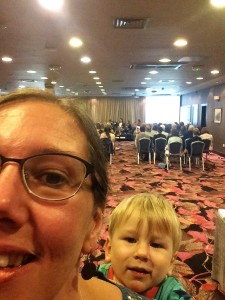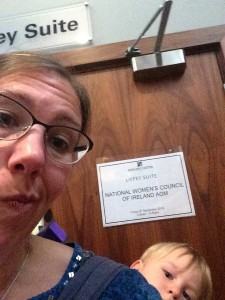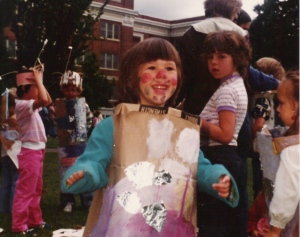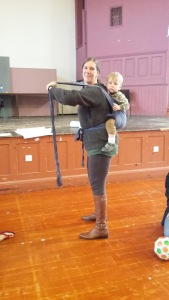Lately, I have been getting some strange looks when I go out to public events like gallery launches, theatre symposiums, or conferences. I even occasionally get ‘looks’, quiet ‘tut-tuts’, and even shushes accompanied by glares. I look around, wondering what manner social faux pas I appear to have committed. Then, looking over my shoulder, I see a small child strapped to my back.
Why am I getting this reaction? What is the social or behavioural expectation I am transgressing?
I was an activist, theatre maker, and ardent feminist before I had kids, and my passion for equality and desire to work towards a fairer and more equitable society has only deepened since I have become a mother. If have a toddler with me, it’s not because he is an adorable fashion accessory (he is of course, everyone says so), or that I cannot bear to be separated from him (love him dearly, but no). The reason is, like many people, I struggle to pay for even part-time childcare. Which means during the day on a Monday or a Friday, if I want to work or participate in a public event, I must bring the little guy with me.

When he was smaller it wasn’t an issue, people seem to be easier around babies. Especially if they are being breastfed. But since he has been walking and talking, I have been getting some negative responses.
Something happened one Friday that really woke me up!
I was invited to the National Women’s Council of Ireland event on Friday the 9th of September. I was pleased to be there as an individual member, and also representing #WakingTheFeminists and MAM (Mothers Artists Makers).
On arrival, I was told that having my child with me shouldn’t be a problem, but they would appreciate me stepping out of the room while the Minister was giving the keynote address. The same person checked that I did actually leave the room after the Minister arrived.
So there I was, following Minister Frances Fitzgerald’s keynote speech on the Twitter feed, from outside the door. It was only when the Minister began speaking about the impact of childcare on women’s ability to participate in public life, that I awoke to the irony of the situation. I was outside the door at a public event that I had been invited to, following the keynote address on social media, because I had a child with me.
That this happened at the National Women’s Council of Ireland’s launch of their strategic plan; a plan that highlights access to childcare as one of the successes of the past year, somehow moved my experience beyond even the realm of irony.
The NWCI states that their mandate is “to take action to ensure that the voices of women  in all their diversity are heard.”, and their vision is “of an Ireland and of a world where women can achieve their full potential in a just and equal society”. Shouldn’t a diversity of views include the 54% of women in Ireland who are mothers?
in all their diversity are heard.”, and their vision is “of an Ireland and of a world where women can achieve their full potential in a just and equal society”. Shouldn’t a diversity of views include the 54% of women in Ireland who are mothers?
It is hard to have your voice heard or realise your full potential through a closed door.
Now I will clearly state that I do not believe this incident represents the views and policies of the NWCI. Overall, when I was in the room, I felt welcome and included in what was a very positive and exciting day.
But when this happened one Friday, it woke me up to the underlying tension that exists within feminism around the great unresolved….Motherhood!
The event brought home for me an awareness of the underlying assumptions that made it possible, and even reasonable, to ask a member of an organisation to leave the room during the keynote address, simply because she had to bring her child with her. These assumptions affect me, as much as the person who asked me to step-out and those who were aware and said nothing.
For all that I am an activist, I did not protest. I took it for granted that by bringing my child, I was being awkward and inconvenient. I was eager to accommodate to organisers and grateful to be allowed to be there at all.
I was actually asked to leave the room a second time at the NWCI launch, while Senator Lynn Ruane was passionately speaking about the matriarchs of her working class community, working like hell to raise their children and grandchildren while keeping food on the table. Needless to say, with Senator Ruane’s words ringing in my ears, I politely declined to leave the room a second time.
I really don’t want to be a walking political provocation, just because I have no choice about bringing a child with me. But provocative is how I feel when confronted with requests to leave the room, with looks, tuts, and glares.
I have become an unpleasant, involuntary act of the body politic.
My mother took me to an anti-nuclear demonstration when I was three, and many  environmental and feminist events thereafter.So I have been an activist my whole life. I grew up feeling that I had a voice, and a responsibility to work for justice and equality. As a theatre maker, I have worked to create positive social change for a range of marginalised groups, including women.
environmental and feminist events thereafter.So I have been an activist my whole life. I grew up feeling that I had a voice, and a responsibility to work for justice and equality. As a theatre maker, I have worked to create positive social change for a range of marginalised groups, including women.
I am cheerfully raising future feminists (both male and female), why does that make me an awkward inconvenience? Both my children are curious and sociable. They enjoy being with groups of people, and I think it is brilliant that both my children have the exposure to public life that I enjoyed and benefited from so much myself as a child.
So why, last Friday, was I left outside the door for the keynote address at the National Women’s Council launch of the #Feminist Agenda?
The NWCI has made great strides for women in recent years. There are many policies that  support the inclusion of women who are breastfeeding. We now have a second ECCE year for pre-school children. Yet, there is still the expectation that when it comes to public life, children should neither be seen or heard. And without adequate childcare or provision for children at events, that extends to their parents as well.
support the inclusion of women who are breastfeeding. We now have a second ECCE year for pre-school children. Yet, there is still the expectation that when it comes to public life, children should neither be seen or heard. And without adequate childcare or provision for children at events, that extends to their parents as well.
This is not just an issue for parents of young children, there are many long years where the school bell calls women and men away from work and public life to the school gates.
Feminism has long struggled with issues and impact of motherhood.The same anxieties and tensions are reflected in wider society. In Ireland, women are still the primary care givers, both for children and other family members. This work is perceived as low status, often voluntary, unpaid or low paid. There is a history within feminism of wanting to disassociate from the traditional role of motherhood, and the lack of autonomy within the conformity to social norms that it can represent.Historically, women in society have been controlled through their reproductive capacity.In Ireland, one only has to think of the legacy of the Magdalene Laundries, lack of access to birth control and the on-going legislative control exercised by the 8th Amendment over women’s bodies, to understand why feminism has stayed away from motherhood and the social disempowerment it can still represent today.
But feminism is about expanding the possibilities for women, not limiting them. Women are still disappearing from public life. if that is to change, we need to change how we view motherhood and start supporting women who have children to participate fully in public life.
So let me ask the question, what has to happen before we stop asking mothers to ‘step out’?
Imagine a conference with a small play area in the foyer, or at the back of the room.
Imagine older children being able to participate in events that will shape the world they grown up in.
Imagine that we include the full range of voices and experiences of our society in public discussions.
Imagine a world where women do not disappear from public life when they have children.
Kate Harris is the director of 4elements theatre company
She is on the research groups of MAM and WTF

Fascinating to read, as a single parent cannot afford costly childcare. So as an SPARK and NOPFN activist with a special needs child to boot (try getting childcare with autism or ADHD as the needs mean unlikely anyone would offer childcare) I hear you loud and clear. There are events like talks about ADHD and school open nights and workshops for learning disorders and so on…all would greatly assist me in providing care for my son. Alas but I often cannot attend vital events, even advocacy ones only on rare occasions, These ones where I need to speak out or contribute, are impossible to get to, let alone social ones so I find it more and more necessary to shout out to those women in power and positions of influence. Hear us all, those other women, those who are mothers, those who have no partner or no support structures to attend these events, we need you to advocate harder for us who cannot. And of course, social media, as it may be isolating at least I can access it without disruption mainly, is a godsend. thanks you for saying this. I hope NWCI acknowledge the point you are making and take it as constructive input and not criticism. As I struggle to go to pre Budget events, forums and protests also such as against the OPF reforms or SNA cuts, I completely empathise. Mothers voices must be heard too.
LikeLiked by 1 person
Thank you Deirdre
We have a few Special Needs Parents in our ranks and appreciate the additional supports needed and battles to be had to get what you need for your children. Extra effort needs to be made to ensure that all voices are heard.
Thanks for taking the time to respond. We too, hope that NWCI will take the blog in the spirit that it is intended.
SF Web Admin
LikeLike
Great article. Thank you for speaking up. We have just published a book last week – Liberating Motherhood by Vanessa Olorenshaw that I think you might find interesting.
LikeLiked by 1 person
Hi Lucy,
Put a link on the page to the book. Dying to get a copy so will order mine shortly.
Delighted you liked the article.
SFitz
MAM WP Admin
LikeLike
Very interesting and passionate read. Woman who work outside the home and are mothers can also relate to this. Womens equality and motherhood are still two very separate entities. A more inclusive and flexible approach is needed across the board. To be seen as passionate about motherhood when in professional situations is perceived as not being fully committed to your work. Women are expected to box off the separate parts of their lives. We need to change that expectation. There is an undertone of not being taken seriously with child in tow, even from the most simple of things like talking to a bank manager etc. I know myself I feel frazzled and apologetic to staff dealing with me with baby on my hip and toddler talking in my ear. Instead of avoiding and apologising perhaps we need to oversaturate society with our children and motherhood! Years working as a support worker for people with disabilities I fought and advocated for inclusion and acceptance for people I supported to attend and participate in events and discussion regardless of any disruption there may have been as I pushed for people to be accepted for who they were and their valid place. Yet I find myself shushing my children and expecting them not to cause a scene in certain similar public situations. What message has been fed to mothers to make that happen? Thank you for the eloquently written article, you have given me food for thought.
LikeLike
Thanks Louise. A lot of this is tied up in how we still expect children to be seen and not heard.
Thanks so much for your thoughtful comment
LikeLike
Reblogged this on Feminist Ire.
LikeLike
Great post and something I think about a lot. You might also be interested in this book on Matricentric Feminism that is just about to be published http://demeterpress.org/books/matricentric-feminism-theory-activism-practice/
LikeLike
thanks – great link- will share it.
LikeLike
Single mothers are at a terrible disadvantage when the fathers are not there to share the burden of having children, to babysit while Mom goes to important meetings where she can learn stuff – or simply take-a-brak. Two of our daughters, became temporary “single mums” while their husbands were away working for months because of their circumstances. I felt so sorry for them. Right now, one daughter’s husband is away for three months – so, as grandparents, we try to help. Single mums, for ANY reason, have it hard.
As for taking kids – especially toddlers – to meetings – in my experience, there are kids and kids. Some are pretty wild and distruptive, especially when grown-ups are trying to think and speak. Others have been taught to adjust their behaviour according to circumstances – or at least the parents assist in that. Fortunately toddlers morph into children quite soon – not long before they become easier on their surroundings and normality/sanity can return.
But then, I’m old. I believe in woman’s liberation, but some Feminism makes me ashamed. That is Victim Feminism I mean! Bringing up kids needs at least two people to share the work, and husbands used to be a nice legal, social and financial protection to many stressful situations women might find themselves in including inheritance and separation.
You say “But feminism is about expanding the possibilities for women, not limiting them. Women are still disappearing from public life. if that is to change, we need to change how we view motherhood and start supporting women who have children to participate fully in public life.”
But I think this is unrealistic. The reason women disappear from public life, is nothing to do with anything other than the fact that having children is THE hardest, most stressful, most frustrating, most exhausting, most thankless, most exciting, most uplifting, most challenging, most meaningful, most fullfilling thing and all else pales on that journey. They are already participating in life – there’s only so much you can do with the energy you’ve got. Our reproductive capacity controls US and there it is. If motherhood is low status, women have made it so. It was once more glorified. So Public Life is difficult with children because WE change when we’ve got them – even if they are not our biological, very own,
Unless you can afford nannies – then public life is easy – with money! 😦
I agree, that in the UK – I can only know what’s happening here – childcare is a luxuary. And that’s not right.
Thank you – I found this a thought provoking post!
LikeLike
Thanks for your comments. We think that with a degree of thoughtful consideration, Mothers don’t have to disappear. Agreed parenthood is all that you lay out, but we as creatives challenge the perception that it is ‘ok’ for us to disappear as this means that our voices are lost, thereby perpetuating the cycle of under representation of mothers in the public sphere. We hope you will support us in getting mother voices out there.
LikeLiked by 1 person